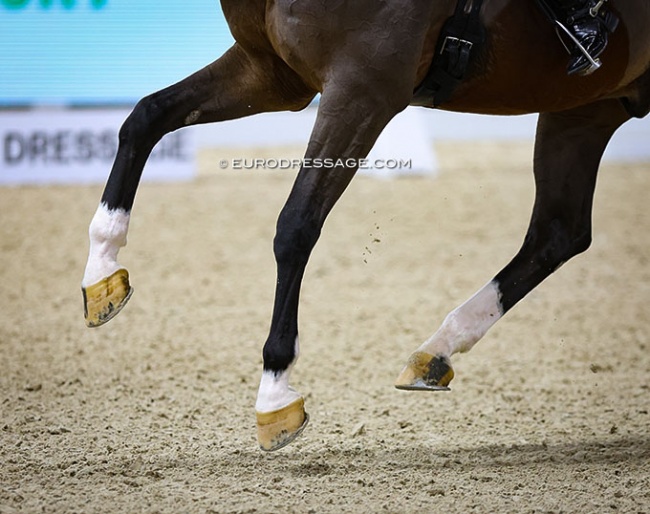
Dr. Inga Wolframm is Professor of Sustainable Equestrianism at the University of Applied Sciences Van Hall Larenstein in the Netherlands. She holds a PhD in rider psychology and an MSc in human and equine sports science. She’s passionate about equestrian sport, and even more passionate about making it future-proof, by demonstrating how humans and horses can interact sustainably with each other and the environment. Her research focusses on using evidence-based theory to explain real-life problems and develop practical solutions for equestrians everywhere.
My equestrian wish for 2023: “Be the change you wish to see in the world.”
These ten short words by Mahatma Gandhi form what might be the most important message of our time. The events of the past year (and the years before that) have made it abundantly clear that we have no time to lose. This applies as much to society as a whole, as it does to us as equestrians. If we wish to preserve that which matters, for the sake of our horses and generations to come, we need to set in motion a system of change right now.
But change can be frightening, especially when it requires a fundamental shift of how we think and act. Having to give up something that feels like a part of our identify, that has shaped us into who we think we are, brings with it its own brand of terror.
Equestrianism in the 'Tipping Phase'
To help us cope with the dynamics of our world being turned upside down, a change (there’s that word again…) in perspective can be useful. Jan Rotmans, professor of Transitions and Transition Management at Erasmus University Rotterdam, advises to take a step back and take in the bigger picture. That’s because fundamental change doesn’t happen overnight. It develops and evolves over time, across decades, sometimes even centuries, in fits and starts, slowly and almost imperceptible at first. Eventually though, this ‘pre-development’ phase results in a so-called ‘tipping phase’. At that point, chaos is usually the order of the day. And even though that accompanying feeling of confusion and unrest isn’t pleasant, it is necessary to allow for the introduction of novel ideas and innovative solutions. If done right, (and yes, that’s a big ‘if’), the best of these ideas and solutions will pave the way for a new, sustainable way of doing things.
The good news? From where I’m standing, everything points towards equestrianism having reached the tipping phase. The telltale signs of chaos and confusion are accompanied by a good dose of innovation and the will to do things differently.
How We, Creatures of Habit, Can Move to Decisive Action
So the question is, how do we move from a state of confusion to coordinated, decisive action. I’d be lying if I said that I had all the answers. I don’t. I am convinced, however, that the first step to finding out what the answers might be is to realise who we’re dealing with. Precisely: people.
As human beings, we pride ourselves on our highly evolved cognitive abilities, but we’re also creatures of habit. Many of our daily activities, including the way we perceive ourselves and the world around us, are governed by an implicit (i.e. automatic), unconscious and almost effortless way of thinking. This so-called System 1 was first introduced by the psychologists Keith Stanovitch and Richard West, and made popular in Daniel Kahneman’s bestseller Thinking Fast and Slow. System 1 is immensely useful as it allows us to go about our daily tasks without having to spend precious (mental) energy. The brain might only weigh in at 2% of the body’s total mass, but it consumes a massive 20% of the body’s total energy. Preserving energy by relying on our automatic system isn’t merely a very efficient way of living, it probably also contributed to the survival of our species. However, the downside is that, when there is a need for change, functioning on auto-pilot won’t do.
Establishing new behaviours requires us to engage in systematic, logical thinking. Our ‘effortful system’ (or System 2) comes into action, as we examine the choices, conventions and routines we have developed (as a sector, and as individuals) and come up with alternatives. Such processes will be as exhilarating as they will be exhausting. Which is why there may come a time when it’ll seem o so tempting to give our System 2 a break and simply revert back to our old way of doing things.
"We need not wait to see what others do"
This where the full-length version of Gandhi’s quote might provide us with additional guidance and much needed inspiration.
"We but mirror the world. All the tendencies present in the outer world are to be found in the world of our body. If we could change ourselves, the tendencies in the world would also change. As a man changes his own nature, so does the attitude of the world change towards him. This is the divine mystery supreme. A wonderful thing it is and the source of our happiness. We need not wait to see what others do.” Mahatma Gandhi
So, as the sometimes exhilarating, sometimes petrifying 2022 draws to a close and 2023 dawns with all the promise of a new year, I wish you all the courage to take the future of our way of life into your hands and to live the change our horses deserves.
- by Inga Wolframm
Related Links
Dr. Inga Wolframm: "What is a Piece of Tack?"
Natural Bias, the Hidden Controversy in Judging Sports
In the Firing Line: The Dressage System of Judging
The Judging System in the Firing Line at the 2010 Global Dressage Forum
Inga Wolframm on Visual Attention Patterns in Grand Prix Dressage Judging